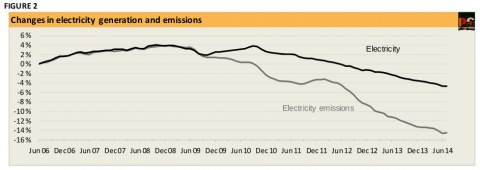The latest CEDEX assessment by Pitt and Sherry shows an increase in Australian electricity demand in June and July with rising supply from coal and gas since the Abbott Government abolished the carbon tax and talked about abolishing or emasculating the Renewable Energy Target with the Warburton Review. Emissions rose by about 1 million tonnes - about 0.8 per cent. It is the largest 2 month increase since 2006 according to Peter Hannam in the Sydney Morning Herald.
The monthly Pitt and Sherry CEDEX report tracks carbon emissions, electricity contribution from different generator types and electricity demand.
The August 2014 report, with data to the end of July, concluded:
With the carbon price having ended and report of the RET Review expected in the next few weeks, it is timely to assess the contribution of the various drivers to the fall in electricity generation emissions since the peak reached in the year ending December 2008. The fall in emissions since then has been 18%, all resulting from the decrease in coal fired generation, making for a relatively simple calculation. Reduced demand has contributed 49% of the total emissions reduction, increased hydro and increased wind each 19%, and increased gas generation 9%. The remaining 4% is attributable to increases in the average thermal efficiency of coal fired generation, as older, less efficient generators have lost market share or been withdrawn from operation altogether. These changes in demand and generation mix are the result of the RET (in its various forms), other pro‐solar factors like falling costs and feed‐in tariffs, higher retail prices, energy efficiency policies and the carbon price. Many of these policy, technological and consumer demand factors remain highly dynamic.
Abolishing the carbon price and the Warburton review has greatly impacted on business investment certainty in Australia. While there are still some wind and large scale solar projects in NSW and Victoria under construction, after which there is little investment in the pipeline for large scale renewable energy.
This change also signals an increase in the profitability of the coal generators, at the expense of the pollution and social impacts of coal mining, transport and power generation. Just ask the people in Morwell or Anglesea how they feel about the continuation of coal pollution instead of more sustainable and non-polluting energy generation.
The dinosaurs are roaring, but it is stalling the inevitable with reports from the Worldwatch Institute that Renewable Energy at the Tipping Point and according to a Clean Technica report Renewable Energy Momentum Has Passed The Tipping Point.
These fossil fuel companies know their Kodak moment is coming and are trying to extract a little more profit from consumers which will only make people's willingness and preparedness to transition to alternatives when they are available more prominent.
This story was originally posted to Climate Action Moreland.


